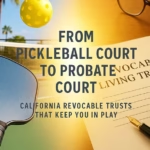
When Is a Good Time to Revisit Your Estate Plan?
August 1, 2025
From Pickleball Court to Probate Court: How a Revocable Trust Keeps You Out of Trouble in California
August 13, 2025Ways to Revise a Revocable Living Trust in California: Understanding Restatements and Amendments

A revocable living trust is a cornerstone of many California estate plans. It allows you to retain control over your assets during your lifetime while providing a clear roadmap for the management and distribution of your estate after your death. At the Kushner Legal Corporation, we often consult with clients whose life circumstances have change after establishing a trust. Marriages, divorces, births, deaths, and changes in financial situations can all impact your estate plan. The California Probate Code recognizes the importance of keeping your trust up to date. This article explains the primary ways to revise a revocable living trust in California and the differences between a trust restatement and a trust amendment.
Revising a Revocable Living Trust Under California Law
Under California Probate Code Section 15401, the person who created the trust, known as the settlor or trustor, has the authority to modify or revoke a revocable trust unless the trust document states otherwise. The Probate Code allows modifications to be made either in the manner specifically provided in the trust document or, if no specific method is stated, by a written instrument signed by the trustor and delivered to the trustee during the trustor’s lifetime.
There are two main approaches to revising a revocable living trust in California. These are amendments and restatements. While both methods alter the terms of the trust, they do so in very different ways.
Trust Amendments
An amendment is a legal document that makes specific changes to certain provisions of the original trust. It allows you to change one or more sections of your trust without replacing the entire document. For example, you might execute an amendment to change your successor trustee, add or remove beneficiaries, or adjust specific distributions.
Amendments are often used for minor or isolated changes. They are typically attached to the original trust and are read together with the initial document. However, if you make multiple amendments over time, your trust can become confusing or difficult to interpret. Each amendment builds on the prior ones, and inconsistencies may arise if the changes are not carefully drafted.
Amendments must be executed with the same level of formality as the original trust. In California, this generally means that the amendment must be in writing, signed by the trustor, and often notarized. It should be kept with the original trust document to ensure that future trustees have access to all relevant terms.
If you need to amend your trust please get in touch with us and read more about it here.
Trust Restatements
A restatement is a more comprehensive method of revising a trust. Instead of changing only certain provisions, a restatement completely rewrites the trust document while keeping the same name and date of the original trust. A restatement does not revoke the trust or require the transfer of assets into a new trust. This is a key advantage because it preserves the trust’s original funding and avoids the need to re-title property.
Restatements are often recommended when a trust has undergone many prior amendments or when substantial changes to the structure or terms of the trust are needed. By creating a single, updated version of the trust, you reduce confusion and make administration simpler for your successor trustee. A restated trust supersedes all prior versions but maintains the same legal identity, which is important for avoiding title issues with real estate or financial accounts.
Choosing the Right Approach
The decision to use an amendment or a restatement depends on the scope of changes you want to make. If you only need to adjust one or two provisions, an amendment may be sufficient. If you have made several amendments already or your estate plan has changed significantly, a restatement may be the better option.
California Probate Code Section 15401 provides flexibility for modifying a revocable living trust, but these changes must be made carefully to avoid unintended consequences. Consulting with an experienced California estate planning attorney ensures that your revisions are properly executed and legally effective. A well-maintained trust is essential to protecting your wishes and simplifying the administration of your estate for your loved ones.
Contact the Kushner Legal Corporation today to schedule a consultation to discuss updating your estate plan.



